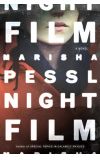
06 Sep 2013 04:18:30
Offstage throughout is a horror-film director, Stanislas Cordova, described variously as "legendary" or even "a myth". A cross between Stanley Kubrick and Dario Argento, the reclusive Cordova is renowned for peculiar working practices, enormous sensual appetites, and the terrifying nature of his movies, most of which are only available as bootlegs. Now his beautiful, mysterious and "intense" daughter, Ashley, has died in possibly dodgy circumstances. Enter our hero and narrator, disgraced fortysomething writer Scott McGrath, who decides to investigate.
I say "hero", but Scott is plainly a bit of an idiot. On the basis of a single anonymous phone call he had once – on live TV – more or less accused Cordova of being a child-murderer, and was then surprised to find his life falling apart and the work drying up. And for a once-successful magazine journalist, he's an alarmingly bad writer. He is addicted to italics, which festoon the pages, straining to turn ordinary words into jolts of surprise and excitement. "I checked the inside pocket," he relates at one point. "It was empty. Yet, I felt something else" (spoiler: it was another pocket.) He describes a woman "staring down at me. Or was she looking through me?" (Nah, she was probably just looking at you, mate.) Sometimes the italics seem forlornly to be trying to elevate a sentence from a kind of bland incompetence to a more baroque awfulness: "That was women for you – always morphing." (Here Scott has not encountered an actual morphing woman, like the one in the film Species who turns into an alien, but just a woman who has changed her mind.)
Scott's poor taste in prose is evidently catching, because other characters he meets instantly begin talking in this robotically emphatic way as well. A drugged-up ex-lover of Cordova's who seems to have stumbled into this story from a minor Tennessee Williams play generously gives Scott page upon page of flashback exposition in this style: "Throughout history, alliances with the devil often manifest themselves in virtuosic mastery of an instrument."
Yes, there seems to be black magic afoot, and so the reader is encouraged to add films such as The Wicker Man and Kill List to a mental shortlist of other influences, which probably also include The Amityville Horror and Un Chien Andalou. The task of describing Cordova's own films in such a way that they justify the awestruck epithets heaped on them by the novel's characters, however, is too much for the author or at least Scott: they sound comically dull.
Scott has two sidekicks. One is a young dude called Hopper; the other a perky 19-year-old woman, with whom he tastefully declines to go to bed. These three keep bumping into each other on the streets of Manhattan, as you do, before haring off to listen to more minor characters telling interminable anecdotes about Cordova or his daughter.
Perhaps the book's most interesting character is a tall fake priest, once the victim of an eerie bed‑burning. There's something up with his eyes, though. "Abruptly, the man jerked his head up and stared right at me," Scott reports. In case those italics hadn't sufficed to make the moment dramatic enough, he starts a new paragraph and goes on: "It was such a penetrating look it stunned me." By this point in the novel, after 400 pages and with nearly 200 still to go, I too was stunned, but not in a good way.
This is not an unremittingly bad book. There is a nicely weird scene set at a secret club called Oubliette (the feel here is a bit Eyes Wide Shut), and near the end, the cinematic conceit flickers to life with a chase through a series of abandoned film-sets, which is a colourfully uncanny sequence. I counted one decent joke and one half‑sentence of thoughtfully imagistic description: an imposing old building at night is "fortified with shadow, as if shadows were the very mortar that kept it standing".
Anyone writing a very long postmodern horror-movie novel is working in the giant shadow cast by Mark Z Danielewski's majestic House of Leaves, any comparison with which will do Night Film no favours at all. But Pessl's book does play more games with cosmetic "documentary" evidence: handwritten notes, interview typescripts, missing-persons reports, and the like. There are also screenshots of fake online articles about Cordova and Ashley in the windows of an internet browser (recognisable as Safari), purportedly from the websites of the New York Times, Time, Vanity Fair, and other real publications. (One wonders what kind of permissions deal, if any, was done with them.) So the internet is here framed as a guarantor of reality for fiction: Pessl has also posted some short videos and other paraphernalia related to the novel online, in a hopeful stab at transmedia virality. All this bespeaks, perhaps, a literary anxiety about authenticity in the digital age, as though publisher and author were worried that mere words on a page were no longer enough. In this case, I'll cheerfully agree, they're right.

